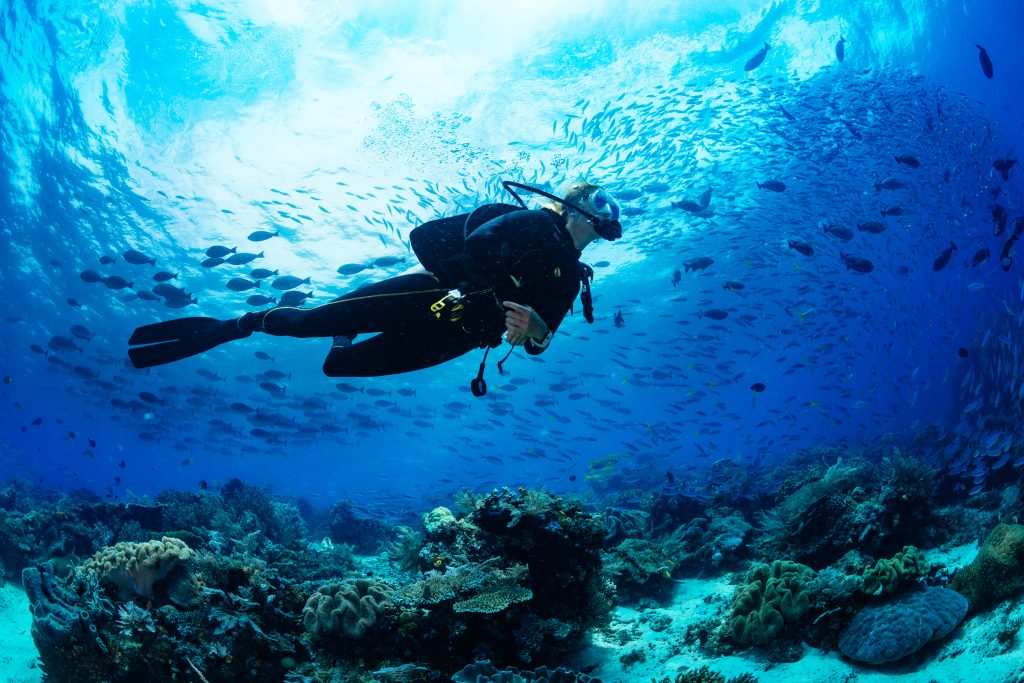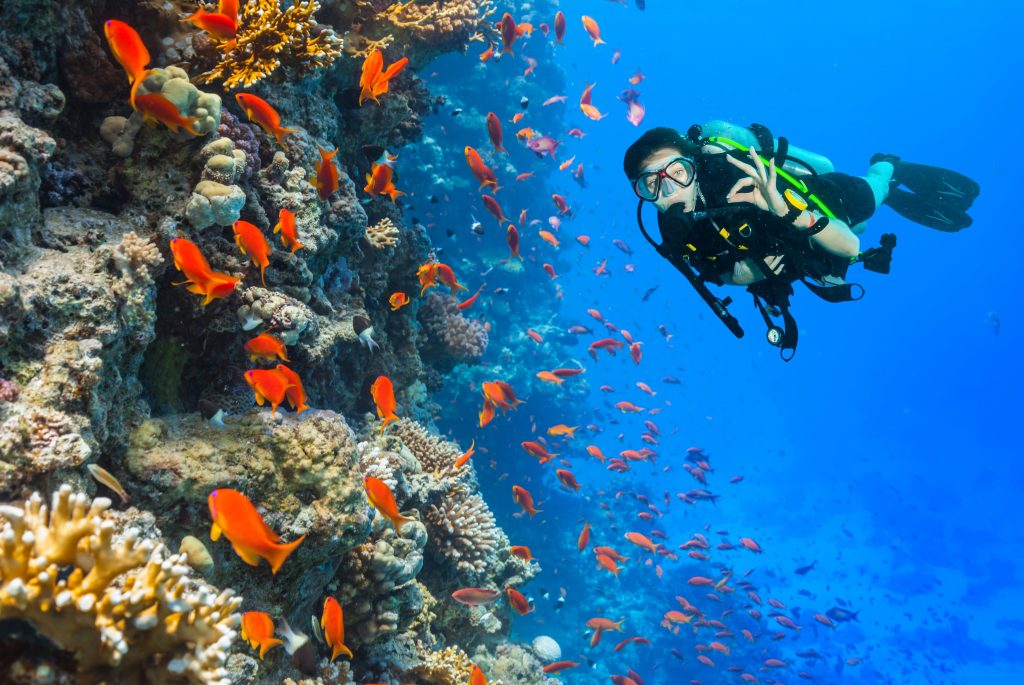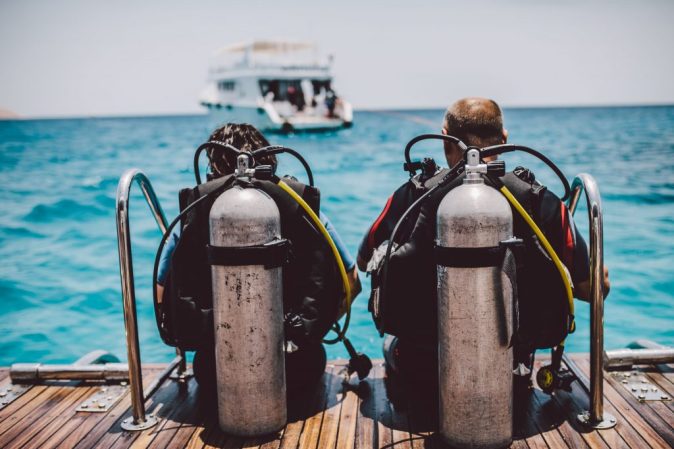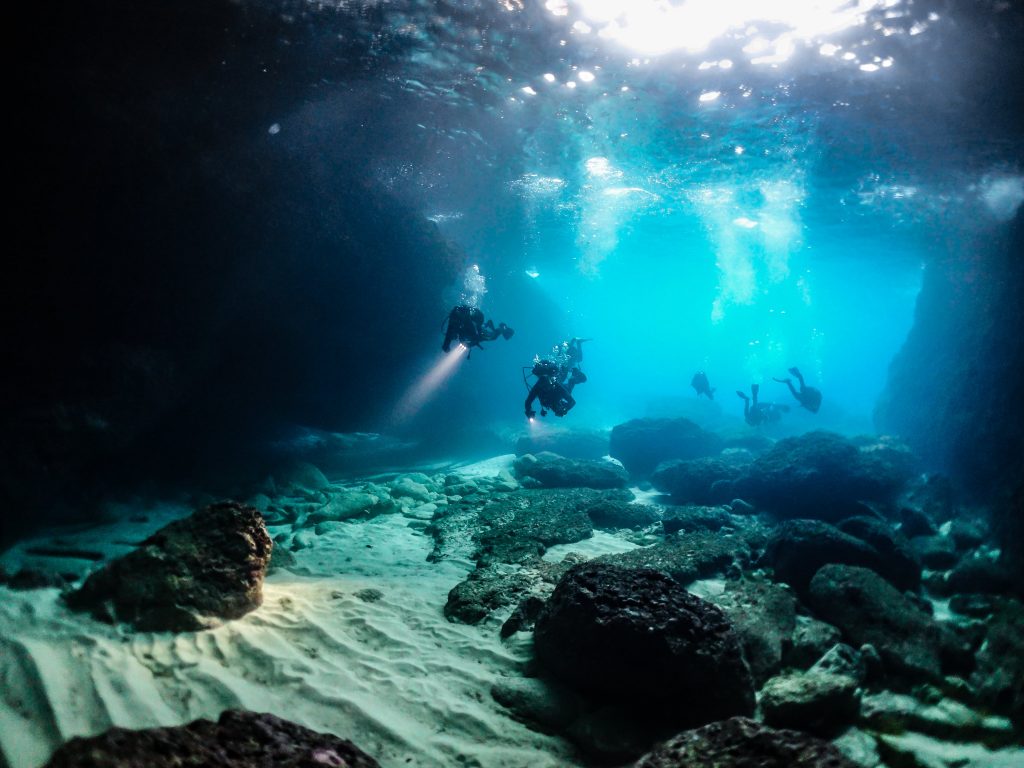Scuba diving can be intimidating, especially when you are a beginner. As a newcomer myself, the world of scuba diving can be hard to understand before you decide to give it a shot and many questions can quickly run through your mind: What course do I take? What equipment do I need? How much does it cost? Is it dangerous?
Before you get in over your head, I will try my best to give you a short and useful introduction to the fascinating world of scuba diving, as I also crack the books. Here are my top tips and the answer to some common questions that you should know if you are looking into immersing yourself in this world.
I’ll answer the questions on this list:
- What is scuba diving?
- How do I get started?
- Which program do I choose as a beginner in scuba diving?
- What qualifications do I have to meet to go scuba diving?
- Is scuba diving a high-risk activity?

What is scuba diving?
This is probably the first and most obvious thing that you should know. The most simple way to describe is as an underwater swimming activity that involves the use of self-contained underwater breathing apparatus (SCUBA).
Scuba diving can be divided into 4 modalities:
- Recreational Diving
- Technical Diving
- Commercial Diving
- Sport Diving
We will focus on the first one on our list, recreational diving, which is the type of diving that people practice for leisure purposes and is usually a beginner’s starting point to learn about this sport that allows divers to enjoy the underwater environment. This type of diving is most widely offered by the different certified scuba diving schools that exist around the world, which we will also learn about.
Recreational diving allows you to dive up to 40 meters, and explore many pretty sites under the water such as wrecks dive sites of ships, aircraft, or artificial structures, coral reef ecosystems, as well as an infinite number of marine animals you’d never know existed.

How do I get started?
Going to a certified diving school or center should be your first step. There is a broad range of over a hundred different diving centers to choose from all around the world. However, you will most likely come across the Professional Association of Diving Instructors (also known as PADI), the largest scuba diving certification agency worldwide.
Getting a scuba diving certification will ensure a safe dive, and easy access to scuba gear rental, plus you’ll also learn how to scuba dive thanks to the professional and experienced PADI diving instructors, creating a safer and better environment so you’ll enjoy the dive experience much more. Other famous schools such as Scuba Schools International (SSI) or the National Association of Underwater Instructors (NAUI) are a great choice as well.
The program of the SSI is very similar to PADI, and also the others follow similar standards, so you can expect to learn similar training content and skills. Deciding which school or center you want to experience your first dive it’s up to you, but it is definitely worth it to go to one for your first time!

Which program do I choose as a beginner in scuba diving?
Various factors can determine the program that better suits you. Time constraints, duration of the course, and its cost are some of the things you should take into account before deciding.
Usually, a PADI scuba diving course for beginners can take from 1 to 3 days, and you will do 3 dives in total, the first being in confined waters (either a swimming pool or in the seashore), and 2 more dives in the open sea.
You can choose a more intensive course with the Open Water Diver course, which will last between 3 and 5 days, and usually includes a single confined water dive, plus 4 dives in the open water. Thanks to this course you will learn all the basic skills to go scuba diving safely.
Both these courses include a theory component that you must overcome in order to achieve the certification (either before starting the course via e-learning materials or directly at the center, depending on the center’s method of choice).
Once you successfully pass the theoretical and practical part of the course you’ll receive an official diploma from your diving center. We recommend that you do some dives with a certified guide afterward so you can practice what you have learned and see the explore sites together with a local guide.
The cost can vary between 250 and 500€, depending on the course, the number of dives, location, or even the season. Luckily, there is a wide choice of courses you can select based on your budget!
If you are not sure about undergoing a longer course, you can also go for a trial dive. It is a great way to get a feeling of the sport without having to enroll in a full-on diving course. The trial dive usually takes one day to complete and it includes one confined water dive of 25 to 40 minutes, and up to 6 meters deep. It is also more affordable and is ideal for first-timers who want a short and easy-going experience underwater with a professional diving instructor.

What qualifications do I have to meet to go scuba diving?
Like me, you are probably asking yourself this same question, what are the requirements that I need to fulfill in order to go scuba diving? Do I need to be over 18? Do I need to know how to swim? What if I wear glasses?
To your surprise, the requirements are minimum! Scuba diving courses are available from the age of 8-12 years old (depending on the specific contents), which are usually named “bubble maker” or “junior” courses. Although you don’t need to have Michael Phelps swimming skills, it is recommended to have basic swimming ability.
Not all schools will require you to know how to swim, but no matter your level of swimming competency, you can learn the basics about scuba diving through the direct supervision of a scuba diving instructor.
If you have poor eyesight as I do, you might be also wondering: How am I going to see the beautiful underwater world? Well, there are two options: you can wear contact lenses, or you can use diving masks with prescription lenses. In the second case, the best way to get them is to contact the school or center that you will be diving with, and they will be more than happy to provide you with them.
You must also complete a medical questionnaire and in some cases even consult with a physician to ensure a safe dive and fun experience.
Is scuba diving a high-risk activity?
Not at all! In fact, thousands of people safely enjoy diving every day. It is considered a low-risk activity, even kids from the age of 8 can join!
You’ll learn all the safety skills meticulously, including some pressure-containing techniques when you are going down or up to the surface. During the whole activity, a professional diver will monitor you and make sure you are comfortable all along.
Even after you get your certification, you should always be accompanied by a professional instructor or a dive buddy. If you stick to the safety measures and undertake the proper training, scuba diving is just as safe and easy as any other outdoor physical activity you might think about!
